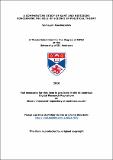Files in this item
A comparative study of Kant and Nietzsche concerning the role of science in political theory
Item metadata
| dc.contributor.advisor | Hayden, Patrick | |
| dc.contributor.author | Abedinzadeh, Somi | |
| dc.coverage.spatial | 129 | en_US |
| dc.date.accessioned | 2010-08-26T10:34:14Z | |
| dc.date.available | 2010-08-26T10:34:14Z | |
| dc.date.issued | 2010 | |
| dc.identifier.uri | https://hdl.handle.net/10023/980 | |
| dc.description.abstract | This thesis is concerned with the implications of natural science for moral philosophy and political theory, from the view point of Kant and Nietzsche. In identifying this association we argue that investigating the differences between these two philosophers’ perspective on natural science in relation to their moral philosophy offers two distinct conceptions of the self, individual sovereignty and free will. This could potentially help us establish a distinction between two different types of social structures that they appear to advocate. The first model represents the Kantian ideal of a republican society, while an alternative society may be characterised by Nietzsche’s Dionysian notion of chaos. The main difference between these two types of societies stems from the role of the individual in their structure, which in turn brings us back to the discussion of moral philosophy and its correlation with our understanding of the natural world. Thus, the thesis aims to point out the inevitability of considering the role of science in the moral philosophies of Kant and Nietzsche, as they sought a revolutionary outlook beyond organised religion and strove to empower human society to rise above millennia of conflict. It transpires through these investigations that Kant’s transcendental philosophy remains deeply rooted in metaphysics; while Nietzsche truly strived for a naturalistic approach beyond all a priori metaphysical assumptions. Through this comparison it is hoped to bring to light not only some of the profoundest differences between Kant and Nietzsche in their natural, moral and political philosophy, but also to contribute to a revival of the trend of natural philosophy that, arguably, declined in 20th century. This objective is pursued through an interpretation of Nietzsche’s thoughts based on a conception of knowledge outside the boundaries of traditional epistemology. In addition, while we note that Kant and Nietzsche’s moral and political philosophy are inherently rooted in their interpretation of natural science, to truly appreciate their divergence one ought to take into account the distinction between classical and non-classical science. The reason for this is that traditional epistemology is generally grounded in a dualistic amalgamation of classical science and metaphysics, while Nietzsche’s reading of science can be viewed with a non-classical outlook. Failure to observe this point may lead to misinterpretation of Nietzsche in a metaphysical vein. It has to be noted that science, in its classical sense, signifies the study of the clockwork nature of macroscopic phenomena. This trend, known as the “modern scientific approach”, began in the 16th century with Galileo Galilei, was later reinforced by Newton and Descartes, and influenced the views of many philosophers from Hobbes and Hume to Kant. While its establishment greatly contributed to the expansion of humanity's empirical knowledge of the natural world, the markedly “rationalistic” aspects of this method gave way to the foundation of dualism. The reason for this is the observation that classical science remains futile in dealing with many fundamental questions of existence such as the nature of mental phenomena, the diversity and complexity of the natural world and the behaviour of natural phenomena on the very small scale. Those aspects of nature are what come under investigation in a non-classical world-view, to which Nietzsche’s philosophy corresponds more closely. Ultimately, the thesis argues that a Nietzschean outlook, as compared to Kant’s classical and metaphysical world-view, may potentially offer a new image of the individual and their place in the society and thereby transforming the dynamics of 21st century world politics in the face of globalisation. | en_US |
| dc.language.iso | en | en_US |
| dc.publisher | University of St Andrews | |
| dc.subject.lcc | JA80.A8 | en_US |
| dc.subject.lcsh | Political science--Philosophy | en_US |
| dc.subject.lcsh | Philosophy and science | en_US |
| dc.subject.lcsh | Kant, Immanuel, 1724-1804--Contributions in political science | en_US |
| dc.subject.lcsh | Nietzsche, Friedrich, 1844-1900--Contributions in political science | en_US |
| dc.title | A comparative study of Kant and Nietzsche concerning the role of science in political theory | en_US |
| dc.type | Thesis | en_US |
| dc.type.qualificationlevel | Doctoral | en_US |
| dc.type.qualificationname | MPhil Master of Philosophy | en_US |
| dc.publisher.institution | The University of St Andrews | en_US |
This item appears in the following Collection(s)
Items in the St Andrews Research Repository are protected by copyright, with all rights reserved, unless otherwise indicated.

